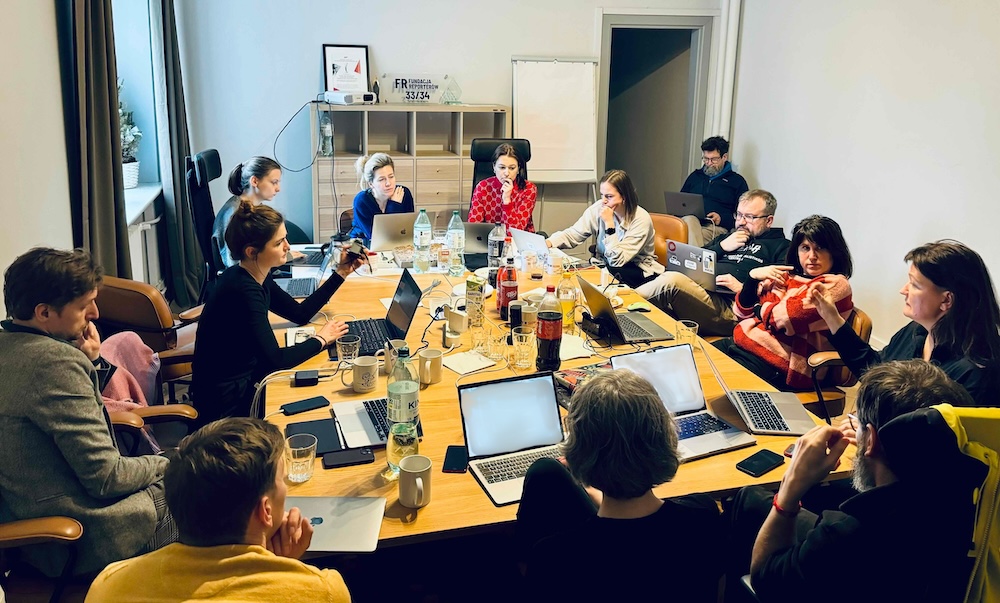Greetings from Warsaw, where our Visegrád region team has joined together with our Baltic colleagues for a two-day brainstorming session on future joint investigative projects. Our new formula is: V4+B3=CEE7. Actually, as you’ll see in this latest newsletter, three out of four recently published VSquare articles are already the result of Visegrád-Baltic cooperation – like our Estonian-led “Kremlin Leaks” stories on how leaked documents reveal Putin’s team pre-rigging the presidential election and how the Russian Red Cross is helping Putin’s war efforts; there’s also the haunting story of a priest who was convicted for possession of child porn in Lithuania and secretly transferred to Poland.
In addition to our latest investigations, we’re serving up spicy scoops on what happened between V4 leaders in Prague behind closed doors, how Poland’s Pegasus inquiry is going, and we reveal a shake-up in Viktor Orbán’s office.
You can also read this most recent Goulash issue online at this link – which I ask you to share with your friends and colleagues, too. And while you’re at it, please also ask them to subscribe – here is the subscription link.
– Szabolcs Panyi, VSquare’s Central Europe investigative editor
Back in 2016, when the soon-to-be founders of VSquare gathered in Warsaw to discuss our cross-border initiative, we worked to come up with a name. Although we eventually settled for VSquare (standing for V4, the Visegrád Four countries), the runner-up name for our site—proposed by Investigace’s Pavla Holcová—was goulash. But no brainstorming session is ever really wasted, and the name will be served as our new newsletter.
SPICY SCOOPS
There is always a lot of information that we hear and find interesting and newsworthy but don’t publish as part of our investigative reporting — and share instead in this newsletter. In this issue, we uncover how the Czech-Polish duo clashed with the Hungarian-Slovak team at recent Visegrád Group meetings, and we also take a look at some intelligence-related developments in Poland and Hungary.
V4 REALITY: TUSK AND FIALA SHOUTED AT ORBÁN WHILE FICO SAT IN SILENCE
This is exactly how the Visegrád Group prime ministers’ meeting in Prague on February 27 was described to me by two government-connected Czech sources with knowledge of the discussion: “It was very wild,” one of them said. Czech Prime Minister Petr Fiala previously had made it clear that no meeting would be possible unless Hungary approved Sweden’s NATO membership – which eventually happened, but only the day before the Prague meeting. After a long period without PM-level meetings and Visegrád cooperation openly deteriorating, the prime ministers wanted to clear the air and have an unfiltered discussion – hence they didn’t let any staffers join them, according to my sources. It was just the four leaders in the room, and their discussion went on for almost an hour longer than was scheduled. Polish Prime Minister Donald Tusk and Fiala questioned Hungarian Prime Minister Viktor Orbán’s Russia policy, asking why he is trying to block and hinder EU support for Ukraine. According to my sources, the debate was so heated that they were actually shouting at each other. The most revealing part of the scene was, however, that Slovak prime minister Robert Fico, who himself pedals the same anti-Ukrainian narratives and claims to play second fiddle to Orbán, simply sat there in silence instead of trying to help him out. (As I described in a previous newsletter, Fico’s attitude is pro-Russian in the streets and pro-Western in the meet(ing)s.) In the end, the joint press conference had to be delayed and the leaders of the Visegrád Group countries all came out looking visibly tense.
WHY KEEP VISEGRÁD ALIVE? TO PRESSURE THE HUNGARIANS AND SLOVAKS
Just after the PMs’ meeting, speakers from the various Visegrád Group parliaments also met in Prague. The event’s host, Czech Speaker of the Chamber of Deputies Markéta Pekarová Adamová, also invited President of Verkhovna Rada of Ukraine Ruslan Stefanchuk, turning the meeting into a V4+Ukraine format – making it even more uncomfortable for her Slovak and Hungarian counterparts to hold their anti-Ukrainian line during the meeting. “The Czech thinking is that the V4 formats still make sense and are good to pressure and confront Slovakia and Hungary,” a Czech source familiar with the meeting told me. “The numerical superiority also helps. Poland and the Czech Republic have a two-chamber parliament, while Hungary and Slovakia only have a one-chamber parliament, so it’s four against two, and this time, together with Ukraine, it was five against two,” the source added. While this meeting was much calmer than the one in which prime ministers screamed at each other, there was still a clash over support for Ukraine. According to my source, Pekarová Adamová made a witty offer to Hungarian Deputy Speaker Csaba Hende and Slovak Speaker Peter Pellegrini. She said that if their countries don’t want to provide direct funding for Ukraine to buy weapons, they could simply just give that money to the Czech Republic — which would in turn buy the weapons for them. “Pellegrini of course was more moderate than Fico, he just repeated the usual ‘we want peace’ narrative and that it makes no sense to give military support to Ukraine. Otherwise, he behaved nicely,” the source said.
POLISH PEGASUS INQUIRY STRUGGLING OVER WHICH NAMES TO MAKE PUBLIC
Donald Tusk’s government is grappling with decisions on how to handle its ongoing inquiry into the former Law and Justice-led Polish government’s misuse of the infamous Pegasus spyware, the Israeli surveillance tool capable of covertly converting smartphones into eavesdropping devices. As a Polish government official with detailed knowledge of the issue told VSquare’s editor-in-chief Anna Gielewska, determining which identities of surveilled individuals to release to the public poses a significant challenge. The investigation has already identified numerous individuals targeted by the Pegasus software across various categories. While some surveillance was found to be justified for criminal or national security reasons, other cases of surveillance were deemed illegal and politically motivated. Nonetheless, within this latter group, there are individuals who would likely object to their identities being made public by the Tusk government.
According to the government official, the inquiry is currently trying to verify the identities of those targeted for illegitimate or political reasons – then decide whose names can be disclosed. However, the task ahead is immensely sensitive and complex, and it will likely be several weeks before any concrete information can be shared with the public. In my own experience with the “Pegasus Project” back in 2021, we faced the same dilemma. Some Hungarian targets clearly looked legitimate while others were obviously political targets. Despite believing in the public’s right to know the identities of these individuals, we had to consider that those surveilled without justification were victims of a crime who deserved to decide whether their identities should be made public. (By the way, I also have a previous summary on what has happened in Hungary since the Pegasus scandal broke.)
HUNGARY’S PROPAGANDA CHIEF TO TAKE EVEN MORE CONTROL OVER INTELLIGENCE
Meanwhile, some serious reshuffling is going on in Orbán’s intelligence staff in Hungary. As I recently tweeted, the Hungarian PM is set to surround himself with a newly created strategic advisory board, partly consisting of national security and intelligence advisors. In reality, this board will mean that Minister Antal Rogán, head of the Prime Minister’s Cabinet Office, whose portfolio currently includes managing government propaganda and oversight of intelligence services, will also take full control over Hungary’s national security apparatus and the country’s defense and national security spending, a source with ties to Hungary’s intelligence community explained to me. Although Rogán gained oversight of Hungarian national security agencies in 2022, some senior members of the “old guard” still stood between him and the agencies, preventing his direct control. They are former head of national police Károly Papp (currently state secretary for intelligence services) and József Kovács, former military intelligence chief and, presently, Viktor Orbán’s national security adviser. According to the source, Papp and Kovács managed to serve as a kind of counterbalance against Rogán using the intel services “for his own political and economic purposes” (as the source phrased it). This was especially true of Papp, who is known to be loyal to Minister of Interior Sándor Pintér, one of Rogán’s main adversaries within the government.
Pintér had been overseeing intelligence agencies until Rogán took them from him two years ago. However, Pintér somehow managed to convince Orbán to leave Papp in his place as direct manager of the services – until now, when both Papp and Kovács were banished to the newly established but rather unimportant Strategic Advisory Board, meaning their current positions can now be filled by a new generation of political loyalists. According to the source with ties to the intelligence community, one possible candidate to succeed Kovács as national security adviser – but with much broader powers – is Marcell Bíró, one of Orbán’s closest and most trusted aides. Papp’s successor — that is, the potential next state secretary for intelligence services — could be his current deputy, Örs Farkas, who also happens to be one of Antal Rogán’s most trusted men. (These human resources decisions are not yet final.) According to another former intelligence officer, Rogán even pushed for his mentee Farkas to fill the parliamentary seat of former justice minister Judit Varga – although it’s unclear whether he succeeded.
SATIRICAL PARTY BENEFITS THE MOST FROM HUNGARY’S BIGGEST POLITICAL SCANDAL
It has been almost a month since Judit Varga and, more notably, Hungarian President Katalin Novák were forced to resign and leave public life due to their role in the so-called “pedophilia pardoning scandal” (for a recap, read my previous story, “Meet the man behind the downfall of Hungary’s president”). The scandal shook the government, which is also apparent from recent nationwide polls showing an approximate 3 percentage point drop in popularity for Fidesz. This drop doesn’t sound that dramatic, and the number is as likely as low as it is in part because the Hungarian government’s efficient propaganda machinery quickly went into damage control mode. However, things seem to be different in Budapest, where the more urban, educated and tech-savvy electorate tends to consume more actual news from independent outlets as opposed to Rogán-controlled propaganda. Around the time of Novák’s resignation, Budapest’s opposition-run leadership commissioned pollster Medián to conduct an opinion poll in Budapest, and a few key findings were shared with me.
According to this poll, Fidesz’s support in the capital went down from roughly 30 percent to 25 percent, while the urban activist / satirical Hungarian Two-tailed Dog Party (MKKP) picked up 6-7 percentage points in support, rising to a whopping 18 percent – making them Budapest’s most popular opposition party. (“The Hungarian Two-Tailed Dog Party is a creative grassroots community that likes humor and believes in direct actions. Not your ordinary political group yet already much more than a joke party,” the party’s website explains.) Meanwhile, the combined support for the traditional (and very fragmented) opposition parties was polled at around 40 percent in Budapest by Medián, meaning they were unable to capitalize on the political turmoil. “In the 18-39 age group in Budapest, Fidesz’s support is almost non-existent at 10-13 percent, but in this age group, the ‘dogs’ are already around 30 percent, just slightly behind the regular opposition,” an opposition political operative told me. Another non-public opinion poll from Budapest, conducted by Závecz Research, put the ‘dogs’ at the same level but slightly behind the Democratic Coalition opposition party with around 14-16 percent of support, according to the source.
Got a nice scoop to include in our Goulash newsletter? Can’t wait to hear it! Send it to me at [email protected]
NEW ON VSQUARE
HOW ORBÁN FLOODED CENTRAL EUROPE WITH MILLIONS IN ONLINE ADS DURING ELECTION SEASON
There’s a good reason why Hungarian propaganda/intelligence minister Antal Rogán’s power is constantly rising: he’s a real master of political scheming. My latest investigation for VSquare and Direkt36.hu describes how the Prime Minister’s Cabinet Office, led by Rogán, easily went around Google’s advertising rules and spent millions in “non-political” anti-migration YouTube ads in seven European countries — including Slovakia and Poland during the final stages of their election campaigns. The potential impact was most pronounced in Slovakia, where the English-language Hungarian ads appeared on local YouTube viewers’ screens exactly as the period where all campaigns were meant to be silent kicked off. According to Slovakia’s former minister of defense, Viktor Orbán’s government clearly interfered with the country’s election with the intention of boosting Orbán ally Robert Fico’s chances. Read the full story here.
PRIEST DOWNLOADS CHILD PORNOGRAPHY, CHURCH EVACUATES HIM TO POLAND
My colleague Mariusz Sepioło wrote this piece for Frontstory.pl together with Lithuanian outlet Redakcija. This cross-border investigation tells the tale of Father Sławomir B. and the Catholic church, which helped cover up his criminal background. In brief, after he was convicted for possession of child pornography in Lithuania, the priest was quickly sent back to his ancestral home of Poland, where he works as a chaplain at a Catholic association – and still has contact with children. Read the investigation here.
KREMLIN LEAKS: SECRET FILES REVEAL HOW PUTIN PRE-RIGGED HIS REELECTION
Yes, I’ve already sent you an exclusive newsletter on the “Kremlin Leaks,” our largest international investigation so far this year, which has since been covered and quoted by many large international outlets. However! As some of you may have missed it, here’s a short argument forwhy you should read it: 1. It’s based on freshly leaked documents from Putin’s presidential administration. 2. It shines a light on how the Kremlin wages what it calls an “information war” against its own citizens, using Soviet-like methods to boost propaganda, indoctrinating Russians while also “pre-rigging” next week’s presidential election. 3. There are also leaked files detailing how the occupied Ukrainian lands are to be integrated into Russia – for example, by making sure that Ukrainians can only watch Russian propaganda channels. Here’s the full article with many more astonishing details.
KREMLIN LEAKS: HOW PUTIN TURNED THE RED CROSS INTO A TOOL OF PROPAGANDA AND WAR
In the sequel to the aforementioned “Kremlin Leaks” piece, journalists working the investigation also uncovered how the Putin administration has infiltrated the International Red Cross and Red Crescent Movement and transformed its local chapter, the Russian Red Cross, into an active supporter of the Kremlin’s war efforts – the humanitarian organization’s local head Pavel Savchuk awarded and praised a Western-sanctioned Russian missiles factory’s management. Read the article here. The whole story is just really absurd.
Here’s a picture of our Visegrád + Baltic group of VSquare partner investigative journalists busy discussing new projects in Warsaw. Outlets represented: Investigace.cz from the Czech Republic; Delfi from Estonia; Atlatszo.hu and Direkt36.hu from Hungary; Re:Baltica from Latvia; Siena.lt from Lithuania; Frontstory.pl from Poland; Investigative Center of Ján Kuciak from Slovakia.

If you like our scoops and stories, here are some more articles from our partners!
MORE TO READ FROM OUR PARTNERS
TESTING THE LIMITS OF AI: DON’T BELIEVE WHAT YOU SEE! Investigace.cz’s Josef Šlerka, known both for his amazing tech skills as well as his great sense of humor, created a deep fake video of Václav Klaus, the Czech Republic’s former president and notorious climate change denier. In the video, Klaus is turned into an environmental activist who calls for a fight against global warming. The message: deep fakes are here, they are pretty realistic, and we should be careful not to be spoofed. (Text and video in Czech.)
SLOVAKIA’S CONVICTED FORMER COUNTERINTELLIGENCE CHIEF LIVES IN MOSTAR, APPLIED FOR ASYLUM IN BOSNIA. ICJK.sk’s Tomáš Madleňák traveled to Bosnia and found Petr Gašparovič, former head of counterintelligence at the Slovak Information Service, who fled Slovakia after being sentenced for corruption. (Text in Slovak.)
LAST VOYAGE. WHERE AND AT WHAT COST DO EUROPEAN SHIPS END THEIR LIVES? As Frontstory.pl’s investigation found: Mostly on the beaches of Southeast Asia, where large ships are taken apart by workers from India, Pakistan and Bangladesh. Their jobs are not only hard and underpaid, but often incredibly dangerous, and even deadly. (Text in Polish.)
SZEGED SELLS LAND TAKEN FROM FARMERS FOR 17 TIMES THE PURCHASE PRICE TO CHINESE FACTORY. Chinese EV giant BYD is building a huge plant in the southern part of Hungary where the local municipality seems to be profiteering. (Text in English and Hungarian.)
SOME HUNGARIAN HOSPITALS HAVE BEEN FACING A SERIOUS INFECTION SITUATION FOR YEARS. YET NOTHING HAPPENS TO THEM. Continuing their award-winning investigation, Direkt36 has obtained and analyzed the latest data on hospital-acquired infections between 2017 and 2022. (Text in English and Hungarian.)
This was VSquare’s 16th Goulash newsletter. I hope you gobbled it up. Come back soon for another serving.
Still hungry? Check the previous newsletter issues here!
SZABOLCS PANYI & THE VSQUARE TEAM
Subscribe to Goulash, our original VSquare newsletter that delivers the best investigative journalism from Central Europe straight to your inbox!
VSquare’s Budapest-based lead investigative editor in charge of Central European investigations, Szabolcs Panyi is also a Hungarian investigative journalist at Direkt36. He covers national security, foreign policy, and Russian and Chinese influence. He was a European Press Prize finalist in 2018 and 2021.







